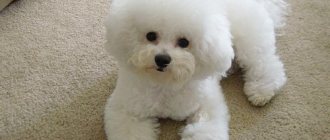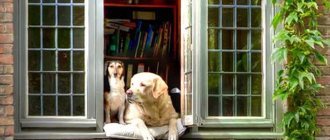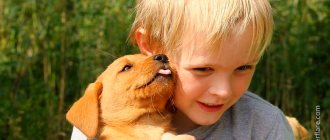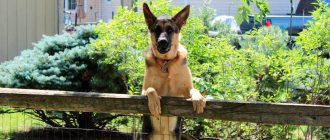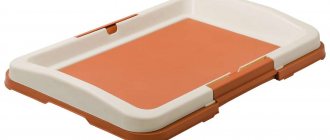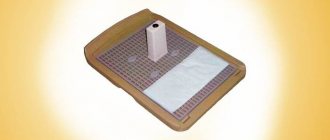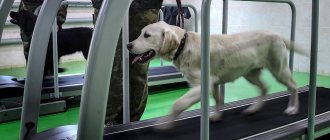Why does an elderly person need a dog?
It often happens in our lives that a pet remains the only devoted friend for lonely pensioners. Pets bring new meaning and a sense of significance to the lives of older people, help minimize pain and normalize their psycho-emotional state. This is how a pet provides its owner with the forces necessary for a joyful life.
Many older people understand that the most interesting and varied period of time has already been lived. The decline occurs not only in health, but also in moral and psychological state. This contributes to the development of severe long-term depression in older people. To prevent this, you need to fill your life with a range of positive emotions, a dog will help with this.
Dogs have the ability to influence the psychological and emotional state of people, eliminating the feeling of loneliness and giving meaning to the moment. Many retirees have to live alone at a distance from their close relatives. It is very important to fill their lives with communication and care. Pets show selfless love to their owners and are constantly nearby. This creates in older people a clear impression that someone needs them and a sense of their usefulness.
When a dog appears in the life of an elderly person, he has a pleasant job in the form of caring for and caring for the pet. Such activities promote a return to activity in the lifestyle and require vigilance, which gets the older person back on the move. Pets also help the visually impaired.
How to choose a dog that will be a devoted friend to an elderly person and will have a positive impact on his life?
You need to know that different dog breeds have different personalities, habits and temperaments. Old people with sufficient energy would be better off purchasing an active and agile dog. People who prefer to lead a calm, measured pace of life should get a small pet. With regard to cats, everything is much simpler. The cat breed is not critical, as they all quickly adapt to the conditions and the owner. But still, it is better for older people not to buy Siamese cats. They require too much attention and are very active.
It is worth paying attention to cats of calm breeds: Scottish or British Fold, Persians. Cats have medicinal properties - they can reduce pain from arthritis, bronchitis, hypertension, etc. People have long noticed that the presence of a dog or cat at home has a positive therapeutic effect on its owner, however, the exact mechanisms of this have yet to be discovered. Pets help strengthen the owner's immunity.
The most obedient
A selection of humble breeds for an apartment for inexperienced owners:
Golden retriever
Despite its size, it is a fairly obedient and flexible dog that will serve as an excellent companion for you and your family. It was brought to the CIS countries in the 1950s of the 20th century and during this time it became completely accustomed to environmental conditions. She completely adopts the owner’s character and does not contradict him.
Can guard the house and babysit children . Does not bark at cats or fight with other dogs, does not make noise at night and does not bother the owner if he sees that he is busy or out of sorts. Quickly learns new commands and discipline rules. To anger him you need to try hard, but at the slightest threat to the owner, he will always come to the rescue, using his powerful paws and fangs .
Four-legged friend: 34 dog breeds for children
Breeds Suitable for Seniors
To be fair, many older people get small dogs for themselves. There are reasons for this: large and active dogs can be difficult to handle even for young, strong men. Therefore, further we will consider only the most suitable breeds for elderly people.
"Pug". These are miniature animals that require maximum attention. Usually they really like to climb onto their owner's lap while he is watching TV or reading literature.
"Scottish Terrier" Scottish dog breed. Weighs from 6 to 9 kg. These dogs are intelligent and quite sociable. But they have a need for long walks every day. They play the role of a sentry perfectly. A dog of this breed will be an excellent consolation for a pensioner.
"Shih Tzu." This is a Tibetan bred dog breed. They love comfort and coziness and need to take care of their coat. Affectionate and gentle.
"Yorkshire Terrier". Small creatures with long hair. A significant part of the time is spent on the couch doing nothing. Long hair requires care, but if you are not going to take it to shows, the dog can be trimmed, which will greatly simplify care.
"Cocker Spaniel". Quite lazy dogs, with a constantly hungry look and curly hair. A good option for older people. These dogs tend to be overweight, so you need to be vigilant in the diet of such a pet and monitor its weight.
"Pembroke Welsh Corgi." Pets of this breed weigh about 11 kg and look small and compact. This pet requires physical activity every day. But he doesn't need a lot of space.
"Eskimo Laika" A breed that has been bred for quite some time and is used as sentinel dogs. They have a cute appearance due to their small size and thick white fur. However, they do not trust strangers. Wool requires almost daily care. Such a dog will be a good friend for a person in old age.
"Boston Terrier" Representatives of this breed are gentle and friendly and have also proven themselves to be protectors. Older people are usually delighted with this breed.
"Chihuahua." Miniature dogs that make a lot of noise. They will be great friends for older people.
"Pekingese". Protruding eyes and a flattened muzzle are characteristic features of these dogs. They require frequent short walks. Their coat does not require complex care, but they will have to take special care of their eyes. An ideal choice for a retiree.
"Toy Poodle" or "Small Poodle". He likes to attract other people's attention, thereby demanding communication with people. This is a spoiled breed of dog and nothing can be done about it - you will have to spoil it. A representative of this breed will help cope with chronic depression.
"Maltese" or "Maltese dog". These are tiny dogs with long hair, having a fragile and helpless appearance. But this is a wrong first opinion. Their coat needs quality care every day. Very sociable.
"Pomeranian Spitz" Brave little creatures. They play the role of a companion and colleague well, and also perform well as a sentry or security guard. There are some similarities with teddy bears; they need care for their appearance.
"English Toy Spaniel." Cheerful and very sociable dogs. But they show these qualities only with familiar people. Another ideal dog for an elderly person.
York
The Yorkie needs enhanced coat care and regular visits to the groomer. When washing, the owner should use mild shampoos and conditioners, and when combing, use a spray. This is compensated by its small size, the ability to train to a tray and its independent character. The Yorkie makes contact and loves to be the center of attention, but is able to entertain himself without the involvement of his owners. Representatives of the breed love games, but get tired quickly, so excessive physical activity is contraindicated for them.
Due to the structure of their hair, Yorkies practically do not shed.
How to choose a dog breed for old people?
What breed of dog is a good fit for your elderly loved one? Below are some guidelines to help you make the right decision:
Suitable size
You should not buy a large dog for an elderly person, even if he has the right temperament.
A dog always remains a dog. When such a docile dog in all circumstances rushes after a cat, it is unlikely that an elderly person will be able to restrain him. Too small dogs, the so-called “pocket” ones, are also not always suitable for individual circumstances. Tiny and playful dogs of the Chihuahua or Toy Terrier breed will be able to slip through a small hole or a door that is not completely closed without much effort. Searching for and then catching a small, agile dog in the stairwells will be a tedious task for an elderly person. It must be remembered that a dog is not a toy for a year or two; as a rule, dogs are purchased for 10 years, and during this time the condition of an elderly person will most likely worsen: mobility will decrease, vision will decrease, and the general condition will change.
There are recommendations to choose a small, but not tiny, or medium-sized dog. For example, small and medium poodles, cocker spaniels, Pekingese, pugs, miniature pinschers, etc. Older people, as a rule, do not take dogs to different exhibitions and do not breed them, so it is worth refusing to buy elite, expensive puppies.
First, visit a dog shelter, consult with an employee, tell him who the dog is for, and then take into account all the subtleties of the choice.
Differences in Temperament
When deciding on a particular breed of dog for your elderly relative, you need to take into account his lifestyle and character traits.
An elderly person with poor health will find it inconvenient to follow the pace set by the dog during a walk. The psychological aspect must also be taken into account: people who live a leisurely, measured pace of life do not need to buy an active, willful and lively dog.
It so happens that pensioners are very often given or bought dachshunds. These dogs have more than enough energy. A Dachshund that cannot expend all its energy on a walk will spend it at home in the apartment, creating a restless atmosphere. Elderly people do not need stress due to cut cables, torn wallpaper and other clutter in the house.
Willful dogs of the Laika, Dalmatian and Chow Chow breeds are not very suitable as loyal friends for older people; they have a special character that will have to be taken into account.
Dog size
Elderly people should not consider large animals, even if the dog has a phlegmatic temperament. Balance of character will always be replaced by bouts of playfulness when the dog becomes several times more active. It will be extremely difficult for older people to cope with a large dog in such situations. It will be much easier to hold a compact dog that will run after the cat.
However, “pocket” dogs require much more attention. Small breeds, such as a toy terrier or a chihuahua, can rush outside through a slightly open door at any time. Such agility and agility can be tiring for older people - it is difficult to constantly chase a dog around the yard. In addition, if the dog cannot be found when it goes missing, this can greatly upset the person. Also, do not forget that the average lifespan of a dog is about 10 years. And if in the first years it will be easy to care for, then with age it will become more difficult for older people.
Therefore, you should not choose miniature and large breeds. It is advisable to choose a medium-sized puppy. You can get a poodle, miniature pinscher, cocker spaniel, French bulldog, Pomeranian, Pekingese or pug. Seniors should not buy an expensive puppy of an elite breed, since they are unlikely to attend exhibitions or professionally breed them. We also recommend visiting the dog shelter. Here you can always get recommendations from employees on which dog is suitable for a particular person.
Buy a puppy or an adult
Find out with experts what age of dog is most suitable for your elderly person. It is necessary to clarify the health status of the pensioner. Puppies require excessive attention: feeding, toilet training, command training. Does an elderly person have enough strength and energy to walk a puppy multiple times every day, constantly bend over to him, clean up after him, wake up at night if he suddenly becomes lonely and wants to have fun?
Talk to breeders to see if they have a grown puppy or adult of the breed you like.
If breed and pedigree do not matter to you, then it is better to choose an adult dog from a dog shelter.
Corgi
A short dog with a slightly elongated body and erect ears. This breed is somewhat reminiscent of a fox. As a rule, dogs' tails are docked. This is a kind of breed standard.
The coat is medium length and has a downy undercoat. Can vary between straight and curly, with some dogs having fluffy fur on their ears.
Corgis are smart dogs; they pick up commands literally on the fly. They can be taught basic commands in just a couple of weeks, starting in the 2nd month of life. It is better to start learning at a young age.
Dogs are friendly and optimistic. They love their owners and get along well with children. You can always trust a corgi with your baby.
If you have slippery floors in your apartment, your corgi's paws may come apart. Experts advise covering the apartment with a special covering.
Toys for puppies should be made of solid rubber, and it is also recommended to let them play with tree branches. Your puppy needs something to chew on for proper dental development.
The dog needs to be brushed daily, and its ears trimmed and cleaned monthly. Experts do not recommend frequent use of shampoo. The soap composition removes the fatty layer from the coat, and it takes about 3 days to restore it.
Who is it suitable for? Suitable for children, gets along easily with other pets.
Subtleties of care
A pet is more likely to have good therapeutic benefits if it is properly cared for.
If the dog is sick, then it will definitely not contribute to the return of the elderly person to a full life. A sick dog will only complicate the moral and psychological state of the owner, forcing him to constantly remember about medical examinations, medications, procedures and a veterinary clinic.
Fluffy and long-haired dogs will need to constantly devote effort to brushing. Schnauzers regularly need trimming - plucking out dead hair. Such procedures are performed by professionals. This will impose additional worries on finances and time management on older people. The optimal choice for an elderly person would be a pet that does not require special care or any procedures.
It is also worth considering such a question as: who will take care of the dog if the owner suddenly ends up in the hospital? If you cannot find a suitable person, and you yourself do not have such an opportunity, then you should think again, and maybe even refuse to get a pet for an elderly person.
Just think about the disappointment and stress that awaits a pensioner from the news that his pet has ended up in a dog shelter. Old people get very attached to their pets and such circumstances can play a bad role in their lives.
Havanese
This dog is very smart and easy to train. She loves children and adapts well to apartment life. Havanese dogs have a hard time with loneliness, and their fur requires serious care.
Other pets also have different characteristics. Recently, scientists have proven the relationship between the character of cats and their relationships with their owners. So it's not just dogs that copy their owners' behavior.
Types and causes of aggression:
- Fear. Threat of violence, threat to the owner, fear for the offspring, etc. may cause the dog not only to defend itself, but to try to destroy the source of fear to save the life of the owner, the puppies, or his own.
- Pain. Experiencing severe or prolonged pain, the dog’s reason and emotions are switched off, as a result of which it easily bites, without knowing who.
- Competition, dominance. The law of life - survival of the fittest, has not been canceled. During puberty, a dog may show aggression towards a potential competitor, thereby fighting for its survival and the opportunity to leave offspring. In properly raised dogs, this goes away by 3-4 years.
- Innate aggression. As a rule, it appears in hunting dog breeds due to unspent potential. Attend to possible hunting objects.
- Food aggression. This is also a matter of survival and instincts. There is no need to get into the dog’s bowl when he is eating from it, because the animal perceives this as an attempt to take away the necessary food from him. This type of aggression can manifest itself at all ages of the pet.
- Content violation. When a dog is regularly violated on an ongoing basis, deprived of the necessary conditions of existence, this accumulates, and sooner or later the dog will take revenge. The results of such aggression are often fatal.
There is only one method of dealing with aggressive behavior - correction of education. This behavior cannot be changed by resorting to beatings, humiliation, or isolation. This will only complicate negative circumstances. If you are raising a puppy yourself, remember the phrase uttered by professional dog trainer Edu Frauli: “There are no problem dogs, there are only problem owners.” In many ways, the aggressive behavior of a dog is influenced by the human factor.
What to do if your pet is aggressive towards an elderly person
It is worth considering that aggressive, angry and bloodthirsty dogs do not exist. No dog will turn into a monster within a few hours if before that he was sweet and responsive. Absolutely every breed is characterized by attacks of aggression, and this applies to stray and domestic dogs. Among people who are bitten by dogs, about 70% are elderly people. Half of them were taken to the clinic with various injuries. The head and face are most often affected.
So why do good-natured animals become uncontrollable? Animal aggression occurs only during times of stress. If the dog experiences a painful shock, is very frightened, or sees competition, feeling hungry, these reasons force him to react. However, abnormal aggressive attacks develop over a long period of time due to poor quality education and violation of maintenance requirements.
You can fight an aggressive animal only with the help of correction. Beating, isolating or humiliating your pet is prohibited as this will only make the situation worse. It is worth realizing that a dog is an extension of its owner. Therefore, if an animal behaves provocatively, the reason always lies in the owner, who could not raise it.
To deal with pet aggression, you need to understand what types are found in dogs and why they begin to behave incorrectly. Let's consider the main factors that can cause rage or anger towards the elderly.
Shih Tzu
The Shih Tzu is another popular small dog. Weighing between 4 and 8 kilograms, the breed is easy to handle. Although Shih Tzus have a bit of stubbornness, most can be trained without too much trouble. Both daily walks and periodic grooming are important for this breed. Shih Tzus are somewhat susceptible to skin conditions and brachycephalic syndrome, but to a lesser extent than the French Bulldog.
Chuhuahua
The Chuhuahua is considered the smallest dog breed in the world, making them ideal for apartment life. The dogs are gentle and require almost no walking. Unfortunately, they are not good with small children and cannot withstand the cold, so Chihuahuas must be dressed when going out for walks. In addition, dogs must be fed a special diet and their teeth must be brushed frequently.
Basenji
The Basenji is the only dog that cannot bark. She will not disturb you with her ringing voice while you are resting. However, Basenjis can howl, so you will have to correct their behavior if bad habits appear. Please note that this breed is not for everyone. Basenji owners claim that their pets are more cat-like in character than dogs. These are playful and wayward pets who require active physical activity. But the Basenji has short hair, which is easy to care for.
The Basenji is considered a capricious breed, so if you are not ready for surprises in your pet’s behavior, you should prefer other options
German boxer
The breed is adapted to protection. The Boxer is very smart, well trained, and fearless when it comes to danger. The dog is active and does not tolerate loneliness. Careful grooming is not required, but it must be taken into account that the dog has increased salivation and will have to frequently wipe its face.
It is impossible to say unequivocally which breed is better. When choosing a pet, you must first of all be guided by intuition and listen to your heart.
Chow chow
The dog combines the nobility of a lion, the fun of a panda, the cuteness of a bear cub, the independence of a cat and the devotion of a dog. The animal is carried with dignity, as befits a breed that was in the past kept in imperial Chinese nurseries.
He doesn't like to be hugged, but will be a quiet, attentive companion to his loved one, and his loyalty will extend to other family members. If he was brought up in a home where there are children, he will willingly accept them.
Beagle
The Beagle is a pet for those owners who are not against active games, but do not like to care for the animal's fur. However, you can choose a puppy with a calm, easy-going character. In most cases, Beagles are inquisitive, love to explore, and easily get along with strangers. There may be difficulties in upbringing: this breed is not inclined to immediately recognize the authority of the owner. But beagles rarely worry about health problems.
Beagles are very friendly, but they require their owner to be nearby.
Pug
Don't expect your pug to guard the house. The breed was bred to be companions, which is what they do best. The pug craves affection and is unhappy unless the devotion is reciprocated. Dogs need constant human interaction. If there is a pug in the house, it will follow the person's heels, sit on your lap and want to sleep in the bed.
Pugs are voracious eaters and will overeat if allowed. They gain weight easily and can become fat, so food intake must be controlled.
Yorkshire Terrier
Small in size but big in character. The Yorkshire Terrier has a feisty personality, but makes a loving and loyal companion. The popular small dog breed has won fans for its loyalty, elegant appearance and ability to live in an apartment. Terriers are affectionate towards family but true to their terrier heritage, sometimes being suspicious of strangers and barking at strange sounds and intruders.
French Bulldog
French bulldogs themselves are lazy and do not like exercise. Often, owners have to force their charges to go for a walk. Caring for representatives of the breed is relatively simple: a minimum of hygiene procedures, choosing a healthy diet and monitoring the well-being of the companion. The only drawback of bulldogs is their tendency to drool. Owners will have to clean more often.
A flattened muzzle puts dogs at increased risk for heart, lung and eye problems.
